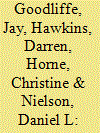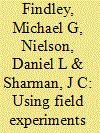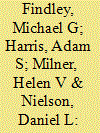|
|
|
Sort Order |
|
|
|
Items / Page
|
|
|
|
|
|
|
| Srl | Item |
| 1 |
ID:
111745


|
|
|
|
|
| Publication |
2012.
|
| Summary/Abstract |
This article explores why governments commit to human rights enforcement by joining the International Criminal Court (ICC). Compared with other international institutions, the ICC has substantial authority and autonomy. Since governments traditionally guard their sovereignty carefully, it is puzzling that the ICC was not only established, but established so rapidly. Looking beyond traditional explanations for joining international institutions, this study identifies a new causal factor: a country's dependence network, which consists of the set of other states that control resources the country values. This study captures different dimensions of what states value through trade relations, security alliances, and shared memberships in international organizations. Using event history analysis on monthly data from 1998 to 2004, we find that dependence networks strongly affect whether and when a state signs and ratifies the ICC. Some types of ratification costs also influence state commitment, but many conventional explanations of state commitment receive little empirical support.
|
|
|
|
|
|
|
|
|
|
|
|
|
|
|
|
| 2 |
ID:
066359


|
|
|
| 3 |
ID:
124383


|
|
|
|
|
| Publication |
2013,
|
| Summary/Abstract |
Efforts to fight international money laundering, corruption, and terrorist financing depend crucially on the prohibition barring the formation of anonymous shell companies+ To study the effectiveness of this prohibition, we perform the first international relations ~IR! field experiment on a global scale+ With university institutional review board ~IRB! clearance, we posed as consultants requesting confidential incorporation from 1,264 firms in 182 countries+ Testing arguments drawn from IR theory, we probe the treatment effects of specifying ~1! the international standards ~managerialism!, ~2! penalties for noncompliance with these standards ~rationalism!, ~3! the desire to follow norms through complying with international standards
|
|
|
|
|
|
|
|
|
|
|
|
|
|
|
|
| 4 |
ID:
156708


|
|
|
|
|
| Summary/Abstract |
Does foreign aid enable or constrain elite capture of public revenues? Reflecting on prominent debates in the foreign aid literature, we examine whether recipient preferences are consistent with a view that foreign donors wield substantial control over the flow of aid dollars, making elite capture more difficult and mass benefits more likely. We compare elite and mass support for foreign aid versus government spending on development projects through a survey experiment with behavioral outcomes. A key innovation is a parallel experiment on members of the Ugandan national parliament and a representative sample of Ugandan citizens. For two actual aid projects, we randomly assigned different funders to the projects. Significant treatment effects reveal that members of parliament support government programs over foreign aid, whereas citizens prefer aid over government. Donor control also implies that citizens should favor foreign aid more and elites less as their perceptions of government clientelism and corruption increase. We explore this and report on other alternative mechanisms. Effects for citizens and elites are most apparent for those perceiving significant government corruption, suggesting that both sets of subjects perceive significant donor control over aid.
|
|
|
|
|
|
|
|
|
|
|
|
|
|
|
|
|
|
|
|
|